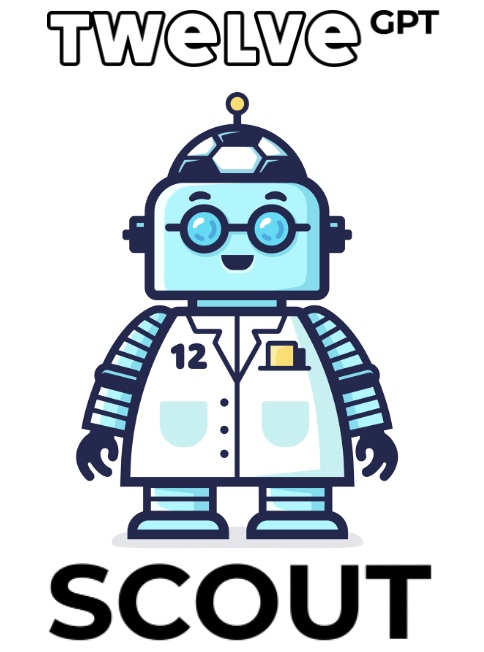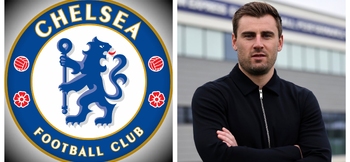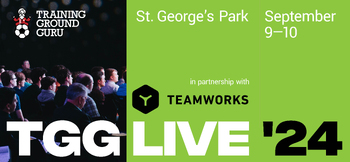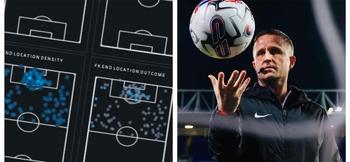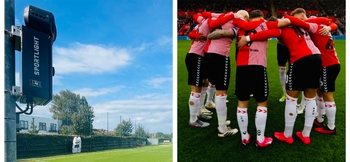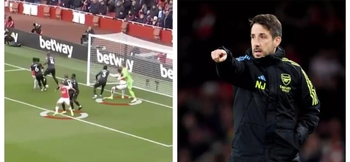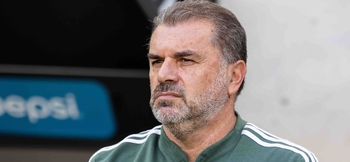TGG Podcast #58: Kevin Thelwell - Something to believe in at Everton
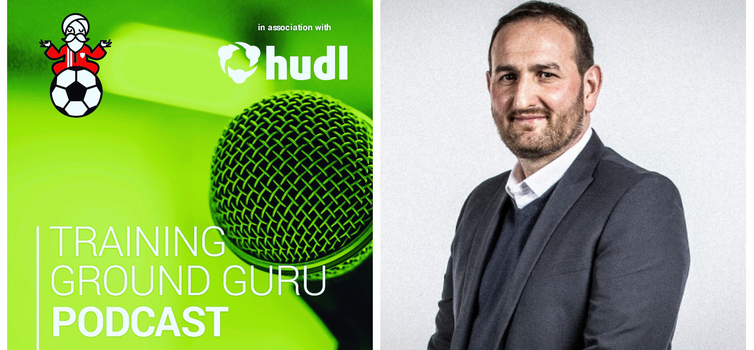
Kevin Thelwell: Was Head of Sport at New York Red Bulls before becoming Director of Football at Everton in March 2022
Written by Training Ground Guru — November 24, 2023
KEVIN THELWELL has been Director of Football during a tumultuous 20 months at Everton.
The club narrowly avoided relegation last season, have just been docked 10 points for breaching Profit and Sustainability Rules and have been put up for sale by owner Farhad Moshiri.
It is a very different to the start of Moshiri's regime, when he promised that the club would be competing for top honours again.
In Episode #58 of the TGG Podcast, in association with Hudl, Thelwell talked about what his role involves, formulating a long-term plan for the club and what the future might hold.
Scroll down to: LISTEN to the interview via the Player below; to READ an edited transcript; and to WATCH on YouTube.
1. RECENT UPTURN IN RESULTS
(The interview took place two days after Everton's 1-1 draw with Brighton on November 4th).
Kevin Thelwell: We’ve been really pleased. We feel as though we’re going in the right direction. We’re not saying we’re changing the story or narrative just yet, but we’re certainly in a much better place than we have been.
If you’re getting results in the first teams it just makes everything that much smoother. The job is about the medium to long term, but you can’t ignore the short term either. The reality of everyone’s circumstances who works in pro sports is everyone has to get results fundamentally.
2. WHAT DOES A DIRECTOR OF FOOTBALL DO?
You’ve got Sean, who’s the manager, who’s responsible for preparation of the team, performance of the team and fundamentally results. Then you’ve got me as the Director of Football, who’s responsible for all of the support operations that sit around Sean and to make sure they’re as strong as they possibly can be to give Sean and the team the very best chance to succeed and Brian (Sorenson) and his (women's) team and the Academy.
It’s a responsibility for strategic function across all parts of the football plan.
3. WHY DID EVERTON CHOOSE YOU?
I’d obviously worked in the Premier League before, which I think was something they were looking for. I had knowledge of the people who were in those positions at that time - Denise Barrett-Baxendale, Grant Ingles, Graham Sharpe, the Chairman, so they knew me and they knew of my work before. After that time I’d spent two and a bit years in New York, so I’d like to think I’m a good fit for the club in terms of the things they see as important.
4. NEW KPIs?
It’s probably difficult for me to comment on what the KPIs were for Marcel (Brands) because, quite honestly, I don’t know. What I do know is he’s a very good Sporting Director.
The remit for me has very much been about doing lots of different things - number one putting in place a strategic plan that helps us to achieve the vision in the medium to long term, build on the previous successes of the Academy, try and find ways of getting young players into the first team, support the first team, and also some very short-term bits as well - in my 18 months, we’ve been going through a very difficult period and supporting the manager to help us to stay in the league has been a big part of the role for sure.
I don’t think it's any secret we’ve got some financial situations we need to resolve and are resolving. Certainly my 18 months has been very much focused on that as well as other things, but understanding PSR (Profit and Sustainability Rules) and finding solutions to some of our PSR issues has been a part of the process I’ve been involved.
Obviously we spent a lot of money in previous times and the reality is you can’t continue to spend and not deliver transfer fees or build a better financial structure etc etc. So a big part has to be - in my time and going forwards - around that financial piece, bringing us back into some financial balance and also creating some sort of financially sustainable plan going forwards.
What we’re trying to do is apply some financial common sense. The reality is you can’t spend more than you earn. That’s the same for Sporting Directors the world over in my opinion. The second bit then, is how do you also create a team that’s competitive in the most competitive league in the world?
They are the two big rocks within my remit - financial balance and also making sure we stay in the league and also start to build something people can believe in out on the pitch.
5. AMBITIONS?
Everybody at Everton wants to get Everton back where we all believe in belongs. The vision has to be, for a big club like Everton, how do we get back among the elite, how do we start competing for trophies, how do we start to get back into Europe.
And of course we’ve got this world-class stadium on the horizon, so we want to build a team that’s going to be befitting of that. That has to be the ambition, because we work at a very big football club where enough is never enough. If we finish 15th this year, we need to finish 12th the year after and so on and so on.
That’s not an issue for me. I think it’s a privilege to work for a big club like Everton. It’s not so much about saying we need to finish here one year and there the next, it’s more about saying how do we find solutions to these short, medium term problems we’ve got and then get back to where we really want to be and people expect us to be.
Mr Moshiri has tried very hard to build something that’s going to be very successful. For whatever reason that hasn’t worked out. There has been lots of change at Everton and we all know that having a very clear identity is a very strong marker for success.
Constantly having lots of change at Everton has caused its own difficulties. We are trying to get into a period of stability, a period where we can start to redress the balance in terms of the financial aspects, but whilst doing that recognising it’s still all about what happens on the grass on a week to week basis and building teams that still have the ability to compete despite this difficult backdrop.
6. HOW DO YOU BUILD A STRATEGY?
In my opinion, it would be very easy for the Chief Executive or the Director of Football or owner to say, 'This is the vision, this is the direction we’re going in, this is what I want to see.' The difficulty with that is if you’re not able to take the workforce with you, then most of the time it’s a plan that’s built on sand.
Once you understand what the direction of travel looks like and have a clear vision, it’s much better to turn to the workforce and say you’re providing the expertise, you’re the specialists in these areas, how do we achieve the vision?
Then you start to build the plan out from there. The reality is that everybody should be a part of it and that’s what we’ve tried to do at Everton. We’re in the process of trying to build a very strong strategic plan that helps us to achieve that vision in the medium to long term and we’re working with all the people at Finch, all the people at the royal liver buildings to be part of that plan, to help us to hopefully get somewhere and stay there and have a very strong plan that stands the test of time.
The club decided on a very clear vision - how do we get back amongst the elite - and then we sat down with all the heads of department who sat down with their departments to start talking about this performance problem - if we’re going to get to that level again, what are the things we do well, what are the things we don’t do so well, and what are the big rocks, the things that are most important to us, to really help us to starry to build something we all believe in.
That’s the process we’ve been through and are still going through. We haven’t at this moment put a dedicated time frame on it.
7. STRATEGIC PILLARS
We’ve got four strategic pillars. Across all of these, we are talking about a very clear plan, which is what does great look like, where are we against that standard - we are talking to staff members about looking at other football clubs, other sports, other businesses - and lets start thinking about a plan that helps us achieve this standard of great.
Then of course making sure we don’t lose sight of who we are, so applying this Everton context and filter. It’s about people being innovative and finding different ways to support this process.
1. Who we are:
At every football club, culture and identity is really important to people and so it should be. We don’t want to get too far from our way, an Everton way.
It’s about culture and identity. Everton has got an incredible history and tradition and its’ clear it values a lot of things and wants its people and players to behave in a particular way. It’s about us making sure everybody understands that.
That starts with the players and Sean is very clear, from when he first came in, is very clear on that. One of his great sayings is we need to get some sweat on the shirt. For me, that is an embodiment of some of those core values - honesty, hard work, respect, humility - it is a nod to working class values, which is what we are.
2. How we play:
There are loads of different examples in the Premier League and all over the world of people having very clear ways of playing and the benefits they get from that.
We got in a spot with New York Red Bulls, and across their other teams, where we were saying, 'This guy is a really good player, but he’s not a Red Bull player.' They were really clear about playing identity, playing philosophy and what they wanted from each player in their position and how they wanted the team to play.
They couldn’t be clearer in terms of how they want to play.That gave us a really clear bandwidth for how we could then search for players. If you haven’t got that clear identity it’s very difficult to put a methodology together, because you’re not sure exactly what you’re looking for sometimes.
The clearer you are, the better you are and the easier it is. It's about a very clear game model, saying, 'What do we expect our teams to do when they’ve got the ball, when they haven’t got the ball and when they’re transitioning to one or the other.'
Where we really want to get to is a spot where people are able to go to any pitch and regardless of the colour of the shirt are able to pick out the Everton team and we want synergies at different age groups. There are loads of benefits that can come from that, in terms of helping young players to progress through the pipeline.
What do Evertonians want from their teams on any given weekend? I think they want to see this dogs of war piece, they want to see honesty, hard work, people playing for the football club, playing for the colours, giving absolutely everything and leaving it all out on the pitch. But they also want to see this school of science bit, this bit they had in the 60s and 70s, they want to see good football, they want to see pass forwards run forwards, they want to see attack, they want to see teams build the game in a particular way.
It’s understanding if you can find a way of playing the game in a way that epitomises those two things, then you’ve got a chance. We should be building on those two pillars and people should see that in all our teams.
This is not something that’s going to be built in a day, it’s going to take some time, because we want this to stretch across all our teams. Sean is finding a way to find results playing in lots of different ways.
3. How we support:
So what do we do in terms of our operational method, stuff like performance analysis, coaching, medical services, sport science. Can we create a really strong golden thread that runs through all our departments, like a best in class philosophy.
How do we create the very best support service that helps our teams to success?
4. Staff development:
I'm a big believer that you’re only as good as the sum of your parts. If you’ve got staff you are continuing to develop and help to improve and they can provide better quality of service, better expertise around the building, then you’re only going to be better for it.
Creating different ways for lots of lots of different individuals to get better. That might be opportunities to do research and development, to present in front of people, working groups that help them work through a performance problem.
8. EVERTON IN MY DNA
My mum and dad are from Liverpool originally. My dad has been an Evertonian since he was born really, he’s a true Blue. I’ve sort of grown up with all those stories of what Everton is and should be and can be from my dad. He’s been at all of the big games over the course of time.
My first ever game was actually at Goodison, it was Mick Lyons’ testimonial in the early 80s. I’ll never forget how Goodison felt at that time. Being from the local area you pay attention to all of these big clubs and what’s important to them, so that’s been helpful.
I definitely think there’s pressure, but I don’t see that as a burden, I see that as a privilege. With that pressure you know you’re working at a big club and with that mentality you’ve got opportunity.
To be able to work for a club like Everton and be able to achieve all the things we think can going forwards - if we just navigate our way through these tricky waters at the moment with a new stadium on the horizon - I regard myself as very lucky and hope people see it in the same way.
To play and work for Everton is an honour, for sure.
9. WHY DID YOU CHOOSE SEAN DYCHE AS MANAGER?
(Dyche was appointed manager in January in 2023. At the time, Everton were 19th in the Premier League and without a league win since October).
Number one, it was about our circumstance. We wanted to stay in the Premier League and had to identify somebody who had experience of that and could do that.
But then also you’re looking for somebody to come in and help you build something. In reality, Sean becomes our football expert, because he’s the guy who’s got one of the main teams and is leading from the front.
From our perspective it was about saying we need someone who’s going to help us right now and Sean was perfect for that. But then also, Has Sean got the ability to help us in the future, medium and long term? And in my opinion he has, for sure.
He epitomises a lot of these working class values we hold so dear, and also he has the ability to evolve his game and philosophy to help us to really get somewhere. And as we sit here today, I think he’s done a really good job.
10. HAS DYCHE EVOLVED AS A MANAGER?
We are very lucky we get access to a lot of data and access to a lot of information around the Premier League. We’ve done a lot of research around what does great look like in the Premier League, what are teams doing to make them so successful, and in my opinion if you look at Sean at Burnley and Sean at Everton, he’s already evolved. The data tells us that, the naked eye tells us that, and in my opinion we’re heading in the right direction.
Of course there’s more evolution to come, there always is, but I think he’s done a really really good job in very very difficult circumstances. To also help to build a team that’s not only got this mentality that we’ve got at the moment - touch wood, he says, holding onto his rosary beads, hoping that continues - but then also to build out the team, in terms of a philosophy, is not easy to do.
So we’ve been really pleased so far.
Everybody points to xG as the big old marker, but I think it’s xG difference that’s probably the most important one, which talks about goals you should score and concede. We don’t believe we’ve got as many points as we’ve deserved this season if we look at this data.
Analysing that data is an important part of the process now, because in the d o f role it would be very easy to become very emotional and just make decisions on the results.
But actually when you look at those underlying statistics it helps you make a more informed, balanced and rounded decision. We are starting to see the benefits of the way in which Sean has set up the team.
11. IS THE ACADEMY A KEY PART OF YOUR STRATEGY?
It should be a key part of the strategy for every club in my opinion. I started as an Academy Manager and am a big believer in giving young people and players opportunities. I believe you’re stronger for it, if they understand the DNA of the club and are part of the fabric.
Creating this pathway for young players to be able to move to towards the first team and have opportunities is a big part of our plan.
Where we want to get to… the only thing that changes is the size of the shirt. The clearer we are in terms of how we want the game to be played, the clearer the players are about that, the easier it should make it for those players to move through the age groups and through this pipeline. A big part of my job then is to make sure we keep then gate open at the far end.
12. WAS THERE TOO MUCH FOCUS ON WINNING AT YOUNGER AGES IN THE PAST?
What we decided to do from the moment I walked in the door was to make the teams younger. We looked at a lot of research to say if players aren’t playing senior football by a certain age it’s going to be very difficult for them to make the next step.
One of the first things I did was appoint James Vaughan to the role of Loans Pathway Manager and he’s done a brilliant job. We started to create these pathways for young players to get more opportunities. While we haven’t seen all the benefits of that in the Everton first team - which is very difficult to do nowadays, especially under difficult circumstances - we have seen a lot of benefit from it from an experiential perspective, something like 25,000 more minutes played by players out on loan from Everton and also from a financial perspective.
We don’t really want to be selling young players, but if there is the opportunity to sell at the right price it would be daft not to do so.
As good as Premier League 2 is, there is a big gap between that experience and the experience of senior level.
13. JARRAD BRANTHWAITE: EXAMPLE OF SUCCESSFUL LOAN?
(Jarrad Branthwaite spent 2022/23 on loan at PSV Eindhoven and has become a first-team regular for Everton this season).
He actually had a difficult start to that season out on loan, he didn’t play a huge amount in the first part of the season, so we had long and hard discussions around what we were to do next with him. That included conversations with Marcel (Brands, PSV Chief Executive and Thelwell's predecessor as Director of Football at Everton), who we know well from his time at Everton, which slightly altered the way the loan contract looked, to make sure there was almost a guarantee of him getting more playing time.
Marcel was very clear he was going to get more playing time, so we all took a little bit of a leap of faith to hold him to his word really. As it was it worked out brilliantly. He got a lot of playing time in that second part of the year, a lot of experience in not only the Eredivisie but also European competition, and we’re reaping the benefit of that now.
We always had him, in our minds, coming back to us and playing in the first team, but of course you then need a manager who is going to give the young player the opportunity and, in our case, under difficult circumstances.
Sean did give Jarrad that opportunity and I’m glad to say it’s working out really well for everybody.
We need to create relationships and synergies and trust between all the departments. We want everybody working together for the same end. If you can create that sort of culture then you’ve got an opportunity.
Yerry Mina hadn’t played a lot and finished the season really strongly and was a big part in helping us to stay up. We could easily have offered him a new contract and another year. Connor Coady had come in the building. Anybody who knows Connor, he’s just a fantastic professional, so it would have ben very easy to add him on a permanent at a very low price.
But we decided not to do either of those things to hold the door open for Jarrod. That can sometimes work the other way and swing against you, but when you’ve got a lot of people around the table believing its the right answer, we decided to do that.
Now we’re all reaping the benefits of that.
14. ?HOW DOES RECRUITMENT WORK AT EVERTON?
My belief it’s not me sat at the top as the rainmaker, its a much flatter structure than that. We work very closely with Sean and the coaching team and other heads of department to help make good decisions.
Right at the start of this process you’re talking to the head coach about how he its going to play, talking to him about what he wants from different individuals in the team per position in the team and then it’s onto search.
Then its a weekly process where we’re sitting down with Sean and the coaching team, idetnfitng where we think we’ve got some areas for improvement or development, and then talking about players who might fit the plan.
15. HOW DO YOU RATE YOUR SUMMER TRANSFER WINDOW?
It was a very difficult window. Our reality is we didn’t have a lot of money to spend. In fact the only money we spent was on a loan fee. I always felt last year, especially with Jarod coming back into the building, we had a good defensive foundation to build off, a very good goalkeeper, strong in the midfield area, but where we were lacking was in the goals and assists space, so the MO for this window was about adding players in that space, more support for Dominic in Beto and (Youssef) Chermiti, a player for today and a player for tomorrow, although Youssef is very capable of supporting today, as he has shown, and then also some more quality in the wide areas, and Jack Harrison on a free loan from Leeds was, in our opinion, a very good take, and Arnaut (Danjuma) from Villarreal also, a very good loan take.
We were generally happy with the players we recruited and the work we did, albeit it can always be better. Under our circs I think we did as well as we could have done.
Very much a changed reality. Again, well documented that we’ve been in a difficult space, certainly in the 18 months I’ve been here, and have been having to find solutions to some of those financial problems.
Ultimately that comes down to what you do with the current group you’ve got, so you’re trying to generate transfer fees to be able to resolve some of those financial issues, and then you’re trying to reduce your level of spend and probably the first place you have to look is where you spend the most money - transfer fees, salaries and agent fees, so it was right to say lets look at the structure of what we’re doing here and make it more manageable for our current circumstances.
16. ROLE OF DATA AT EVERTON
I regard myself as really lucky to have gone to New York and had that experience, especially with the Red Bull group, They’re certainly very strong on data. So to have two and a quarter years to work really closely with data and see how that could not only impact New York but also across the group was a really good experience.
Coming to Everton, I again regard myself as really lucky, because we have a separate insights department which is set up to support the whole of the football operation. When I first joined, it was about moving them from the outside of our space to the centre, to help us make more informed decisions and maybe have a different perspective on performance problems.
Charlie (Reeves) is our Head of Insights. Again, a very very capable individual. We work closely with him - as do Sean and all departments. We have regular reviews around what the data is telling us how it can help us. Where we want to get to and are getting to is, if we have a performance problem, lets go to the insights team first and help them to help us to make more informed and better decisions.
We are very lucky to have him and he’s done a great job. Everybody sees the benefit of that because so many people are knocking on his door.
Charlie, after every six to eight games, will sit down with me and Sean and the coaching team and we’ll have a review and say what’s the data telling us. That really helped us in the early part of the season, because we weren’t picking up results. But when you looked at the underlying numbers we were actually out performing teams.
During that time it can be a difficult space for a manager, so its do I stick or do I twist. Those meetings would have helped me and Sean to say we’re going in the right direction here, let’s just keep on believing in the plan you’ve set out and we’ll get the benefits of it in due course.
The insights team will tell you xg difference is probably the strongest marker of success at the moment and where you are against that number generally determines where you’re going to end up. You’ve got to be careful not to tie yourself up in knots with data, because there’s so much of it, but also you’d be daft if you didn’t pay attention to some of that underlying detail, because it can help you if used in the right way and in the right hands.
17. DIFFICULT TO DEAL WITH PROBLEMS OFF THE PITCH?
I can’t say it makes it easier, for sure, but the reality is I’m 50 years of age now, so I’ve got to that point where you’ve got enough experience to maybe not pay attention to a lot of that noise and focus on the job in hand.
A big part of my job is just that. You’re never going to get one of these jobs where everything is rosy in the garden, its all sailing in the right direction, because there would be no reason to appoint you.
A big part of the job is helping to navigate those difficulties, not only in the decisions you make, but also in the way in which you behave in making those decisions, because, like it or not, people are going to look at you.
Everything begins with the end in mind. What’s the very worst that can happen and work back from that point.
I don’t want to speak too soon, because we are playing in the most unforgiving league in the world. I don’t think we are quite changing the story just yet, but we are hopeful that over the course of a season we can help to do that.
Sean has helped to bring a much stronger culture, a really clear identity of the things we need to do to win games home and away, and that feels like its starting to have an impact on the players. Let’s hope we can keep going in that direction.







